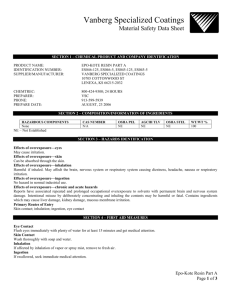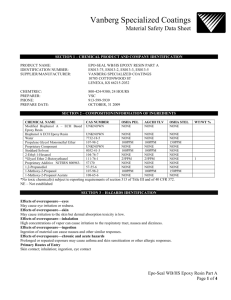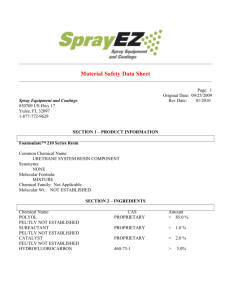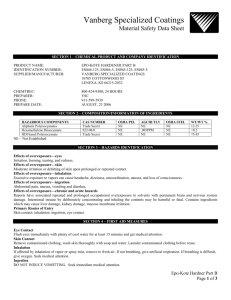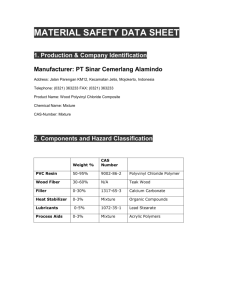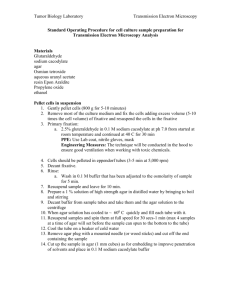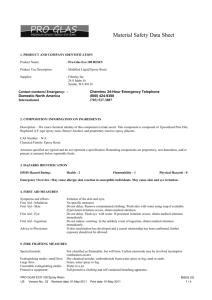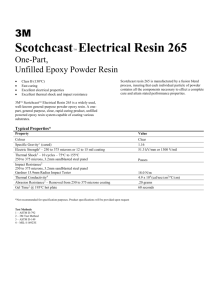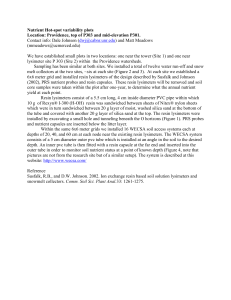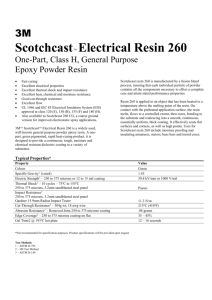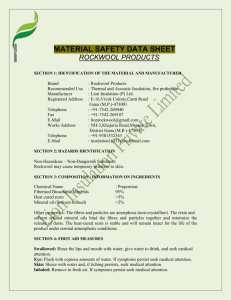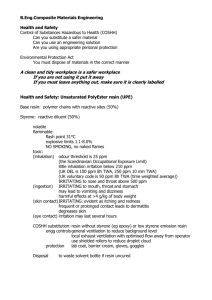section 1 * chemical product and company identification
advertisement
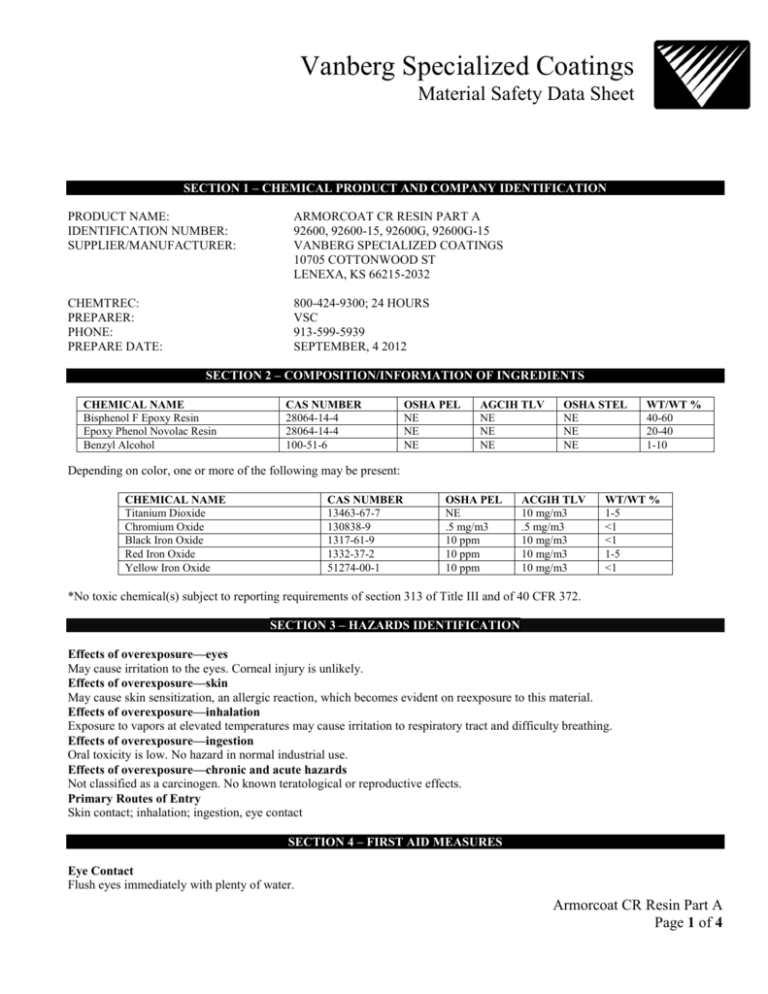
Vanberg Specialized Coatings Material Safety Data Sheet SECTION 1 – CHEMICAL PRODUCT AND COMPANY IDENTIFICATION PRODUCT NAME: IDENTIFICATION NUMBER: SUPPLIER/MANUFACTURER: ARMORCOAT CR RESIN PART A 92600, 92600-15, 92600G, 92600G-15 VANBERG SPECIALIZED COATINGS 10705 COTTONWOOD ST LENEXA, KS 66215-2032 CHEMTREC: PREPARER: PHONE: PREPARE DATE: 800-424-9300; 24 HOURS VSC 913-599-5939 SEPTEMBER, 4 2012 SECTION 2 – COMPOSITION/INFORMATION OF INGREDIENTS CHEMICAL NAME Bisphenol F Epoxy Resin Epoxy Phenol Novolac Resin Benzyl Alcohol CAS NUMBER 28064-14-4 28064-14-4 100-51-6 OSHA PEL NE NE NE AGCIH TLV NE NE NE OSHA STEL NE NE NE WT/WT % 40-60 20-40 1-10 Depending on color, one or more of the following may be present: CHEMICAL NAME Titanium Dioxide Chromium Oxide Black Iron Oxide Red Iron Oxide Yellow Iron Oxide CAS NUMBER 13463-67-7 130838-9 1317-61-9 1332-37-2 51274-00-1 OSHA PEL NE .5 mg/m3 10 ppm 10 ppm 10 ppm ACGIH TLV 10 mg/m3 .5 mg/m3 10 mg/m3 10 mg/m3 10 mg/m3 WT/WT % 1-5 <1 <1 1-5 <1 *No toxic chemical(s) subject to reporting requirements of section 313 of Title III and of 40 CFR 372. SECTION 3 – HAZARDS IDENTIFICATION Effects of overexposure—eyes May cause irritation to the eyes. Corneal injury is unlikely. Effects of overexposure—skin May cause skin sensitization, an allergic reaction, which becomes evident on reexposure to this material. Effects of overexposure—inhalation Exposure to vapors at elevated temperatures may cause irritation to respiratory tract and difficulty breathing. Effects of overexposure—ingestion Oral toxicity is low. No hazard in normal industrial use. Effects of overexposure—chronic and acute hazards Not classified as a carcinogen. No known teratological or reproductive effects. Primary Routes of Entry Skin contact; inhalation; ingestion, eye contact SECTION 4 – FIRST AID MEASURES Eye Contact Flush eyes immediately with plenty of water. Armorcoat CR Resin Part A Page 1 of 4 Skin Contact Wash with soap and warm water. Remove contaminated clothing. Wash before reuse. Destroy contaminated shoes. Inhalation Remove to fresh air. Administer oxygen if breathing is difficult. Ingestion Not likely to occur in normal handling. Give large quantities of water and get medical attention. SECTION 5 – FIRE FIGHTING MEASURES Flash Point >200º F Method used Closed cup Flammable Limits In Air By Volume Lower: Not determined. Upper: Not determined. Extinguishing Media CO2, dry chemical, foam OSHA Flammability Classification Combustible liquid, Class III A Unusual Fire and Explosion Hazards Decomposition and/or products of combustion may be toxic. Special Fire fighting Procedures Decomposition and/or products of combustion may be toxic. Use self contained breathing equipment. SECTION 6 – ACCIDENTAL RELEASE MEASURES Steps to be Taken in Case Material is Released or Spilled Avoid contact. Soak up with clay or other absorbent material. Place in covered container for disposal. SECTION 7 – HANDLING AND STORAGE Handling Wash thoroughly after handling. Avoid contact with skin, eyes, and clothing. Storage Keep containers tightly closed when not in use. If mixture of A and B are allowed to remain in the mixing vessel past the pot life deadline, heat and a strong reaction will result. Grinding or other abrasive action to cured film may develop Micro crystalline Silica dust. Wear a dust mask during such operations. SECTION 8 – EXPOSURE CONTROLS/PERSONAL PROTECTION Engineering Controls Good general ventilation should be sufficient to control airborne levels. Respiratory Protection Avoid breathing vapor, mist or spary. In poorly ventilated areas, a cartridge mask NIOSH-approved for organic vapors is recommended. Skin Protection Where contact is likely, wear chemical resistant gloves, rubber boots, and chemical safety goggles. Eye Protection Wear chemical safety glasses with side shields or goggles. Other Protective Equipment Nitrile rubber gloves Hygienic Practices Wash hands before eating. Remove contaminated clothing and wash before reuse. Follow all MSDS/label precautions even after container is emptied because they may retain product residues. Avoid prolonged or repeated contact with skin. Avoid contact with eyes, skin, and clothing. Armorcoat CR Resin Part A Page 2 of 4 SECTION 9 – PHYSICAL AND CHEMICAL PROPERTIES Boiling Range NE Vapor Density NE Vapor Pressure 1 mm Hg @ 200º F VOC 0.00 Solubility in Water Nil Appearance & Odor Moderately viscous pigmented liquid with a mild odor Specific Gravity (H20=1) 1.51 Evaporation Rate NE SECTION 10 – STABILITY AND REACTIVITY Conditions to Avoid Elevated temperatures. Excess heating above 60ºC over long periods of time degrades resin. Incompatibility Bases, acids, amines and oxidizing agents. Mixing large quantities (1 gallon) with amines or epoxy hardeners can cause heat build-up and hazardous reaction. Hazardous Decomposition Products Carbon monoxide, carbon dioxide and phenolic derivatives Hazardous Polymerization Will not occur under normal conditions Stability This product is stable under normal storage conditions. SECTION 11 – HMIS RATINGS Health Flammability Reactivity Personal 1 1 0 B SECTION 12 – ECOLOGICAL INFORMATION Exotoxicity Material is highly toxic to aquatic organisms on an acute basis. Environmental Fate Bioconcentration potential is low. Biodegradation under aerobic static laboratory conditions is below detectable limits. SECTION 13 – DISPOSAL CONSIDERATIONS Comply with all Federal, State and Local Regulations. SECTION 14 – TRANPORTATION INFORMATION DOT Proper Shipping Name: DOT Technical Name: DOT Hazard Class: DOT UN/NA Number Packing Group: N/A RESIN COMPOUND, NOT REGULATED. N/A N/A N/A Armorcoat CR Resin Part A Page 3 of 4 RQ (Reportable Quantity): N/A SECTION 15 – REGULATORY INFORMATION SECTION 16 – OTHER INFORMATION The information accumulated herein is believed to be accurate but is not warranted to be whether originating with the company or not. Recipients are advised to confirm in advance of need that the information is current, applicable, and suitable to their circumstances. Armorcoat CR Resin Part A Page 4 of 4
